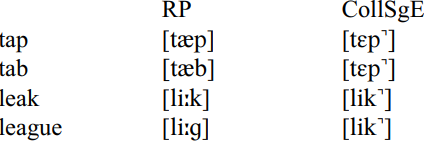


 Grammar
Grammar
 Tenses
Tenses
 Present
Present
 Past
Past
 Future
Future
 Parts Of Speech
Parts Of Speech
 Nouns
Nouns
 Verbs
Verbs
 Adverbs
Adverbs
 Adjectives
Adjectives
 Pronouns
Pronouns
 Pre Position
Pre Position
 Preposition by function
Preposition by function 
 Preposition by construction
Preposition by construction
 Conjunctions
Conjunctions
 Interjections
Interjections
 Grammar Rules
Grammar Rules
 Linguistics
Linguistics
 Semantics
Semantics
 Pragmatics
Pragmatics
 Reading Comprehension
Reading Comprehension|
Read More
Date: 2024-06-22
Date: 2024-04-17
Date: 21-3-2022
|
In CollSgE, stops in final position are often unreleased (represented by the ˺ diacritic), causing the vowels that precede them to become glottalized.

Admittedly a variable phenomenon, the stops may on occasion themselves get deleted so that the word then ends in a glottal stop, as in like [laiʔ] and hit [hiʔ] . Bao (1998: 164) suggests that this is an influence from the phonology of the substrate languages, in particular, Malay and the Chinese dialects. In these languages also, the word-final stops are unreleased, and the vowels that precede them glottalized.
Glottalization also takes place in words beginning with vowels, as indicated in words like a [ʔə] , of [ʔɔf] , eat [ʔit] and apple [ʔεpəl]. Brown (1988: 119) points out that there is no phenomenon of liaison (the linking of the final sound of one syllable or word directly onto the initial sound of the following) in CollSgE, and suggests a relationship between the absence of liaison and the predominance of glottal stops. He hypothesizes that because CollSgE words tend to be separated by glottal stops, this has prevented features associated with liaison (such as linking and intrusive /r/) from arising.
|
|
|
|
لخفض ضغط الدم.. دراسة تحدد "تمارين مهمة"
|
|
|
|
|
|
|
طال انتظارها.. ميزة جديدة من "واتساب" تعزز الخصوصية
|
|
|
|
|
|
|
مشاتل الكفيل تزيّن مجمّع أبي الفضل العبّاس (عليه السلام) بالورد استعدادًا لحفل التخرج المركزي
|
|
|